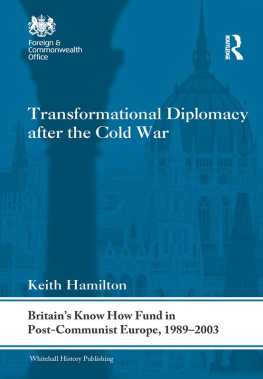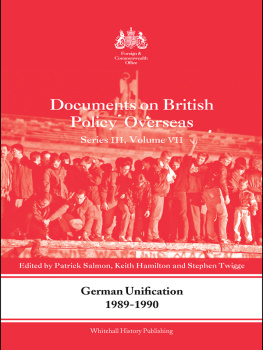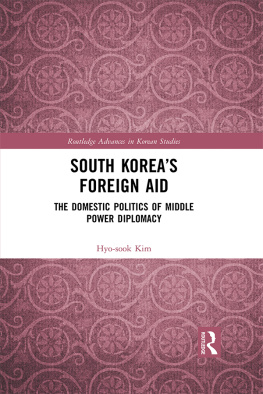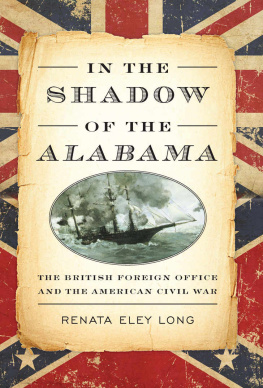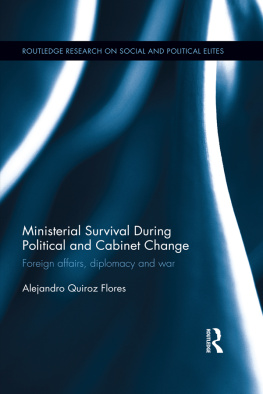Servants of Diplomacy
To Kathy
for putting up with this and me
Servants of Diplomacy
A Domestic History of the Victorian Foreign Office
Keith Hamilton
Contents
This book is about the Foreign Office. It is not about foreign policy. Nor for that matter does it have much to say about such traditional diplomatic skills as negotiation, reporting and representation. Rather, it is concerned with individuals who, though they served the needs of diplomacy, were not generally accepted as part of the Offices regular clerical establishment. Amongst these were the departments domestic servants, its archivists and librarians, and its home and foreign service messengers. They were functionaries with whose histories I became more familiar when thirty years ago I left academe to join what was then the Historical Branch of the Foreign and Commonwealth Offices (FCOs) Library and Records Department (since renamed FCO Historians). A request for a brief history of the Librarians Department and my later involvement in editing and contributing to a collection of essays on the suppression of the slave trade further stimulated my interest in those who, like the clerks of the Slave Trade Department, enjoyed neither the grading nor the career prospects of their colleagues in the Offices geopolitical divisions. There were also, it seemed, tales about accommodation and working conditions in Victorian Whitehall which deserved an airing. Retirement offered me the opportunity to explore these further. But what began as a recreational romp through the archives has since veered towards a more detailed examination of the impact of administrative reform, technological advances and an expanding diplomatic agenda upon the ranking, remuneration and responsibilities of specialist and subordinate staff. The result has been a sort of bottom-up history of those in the Foreign Offices employ who lived and laboured not just below stairs, but upstairs, on the stairs and down the road.
Much of what follows is based upon Crown Copyright documents available at the National Archives, Kew, which I have cited and quoted from in accordance with the Open Government Licence. With the kind cooperation of Professor Patrick Salmon, the FCOs chief historian, I have likewise drawn upon the records of the Librarians Department of the Foreign Office. I am also grateful to the staff of the British Library for assisting my access to the Aberdeen, Canning, Ellis, Granville and Hardwicke Papers in its possession; to the Bodleian Library, Oxford, for facilitating my use of the Clarendon Papers in its custody and possession; and to the London Metropolitan Archives, City of London, for granting permission to reference correspondence in its Willoughby Maycock Collection. My thanks are no less due to the Deputy Keeper of the Records, the Public Record Office of Northern Ireland, for permission to cite and quote from the Lenox-Conyngham and Pakenham Papers; to the archivists of the University of Southampton in respect of the Broadlands Papers; to the present Lord Malmesbury in respect of the papers of the 3rd Earl of Malmesbury in the custody of Hampshire Record Office; and to Elizabeth Dunn of the David M. Rubenstein Rare Book and Manuscript Library, Duke University, Durham, North Carolina, who responded so promptly to my request for a copy of correspondence in the John Backhouse Papers.
Finally, I should like to thank my former colleagues at FCO Historians for their assistance and forbearance, particularly Richard Smith, on whom I have inflicted too many of my chapter drafts for comment and correction, and Nevil Hagon, who has sought out and retrieved printed works unavailable elsewhere. I am also indebted to Professor Geoff Berridge of the University of Leicester for his advice, and to Michael Kandiah of the Department of Political Economy, Kings College London, Alastair Noble of the Ministry of Defences Air Historical Branch, and two other friends, Effie Pedaliu and Jimmy Athanassiou, for their encouragement and support. All errors of fact and interpretation are, of course, my own.
Keith Hamilton
St Vituss Day, 2020
BL | British Library |
DU | Duke University |
FCO | Foreign and Commonwealth Office |
FO | Foreign Office |
GER | Great Eastern Railway |
GPO | General Post Office |
HC | House of Commons |
HRO | Hampshire Record Office |
LD | Librarians Department (Foreign Office) |
LMA | London Metropolitan Archives |
PRO | Public Record Office |
PRONI | Public Record Office of Northern Ireland |
TNA | The National Archives |
UoS | University of Southampton |
The staff of the Foreign Office consists of a Secretary of State, two Under-Secretaries of State, one of whom is a permanent officer, while the other is changeable with each successive Administration; an Assistant Under-Secretary of State, who is also a permanent officer; and Clerks in their several classes.
Foreign Office memorandum, 11 December 1869
You have got three social classes apparently at the Foreign Office.
Robert William Hanbury (Conservative MP), 13 November 1889
The secretary of state, his undersecretaries and their clerks were far from being the sole occupants of the nineteenth-century Foreign Office. As servants of the Crown they themselves were served by individuals, some whose duties were administrative and intellectual, and others whose labours were primarily domestic and mechanical. The departments full establishment thus included librarians, who acted as archivists, publicists and researchers; translators of foreign languages; and bookbinders and printers of official correspondence and parliamentary papers. There were also porters and home and foreign service messengers; housekeepers, their maidservants, charladies and cooks; door- and office-keepers; coal porters and lamplighters; and in the latter half of the century these were joined by telegraph clerks, typists and telephonists. In the 1900s there must even have been a bartender, though he or she was not officially so designated. Two of the Offices librarians, Lewis Hertslet and his son, Edward, are through their published works already well known to diplomatic historians, and the messengers, more especially those who braved the hazards of continental travel in times of war and revolution, have figured in memoirs and recollections and been the subject of at least two substantial monographs.seemed sometimes to belong more to the world fictionalized by Dickens than to that which Castlereagh and Canning helped shape. The departments housekeeper and its senior officekeeper had managerial responsibilities and were by the standards of their day adequately accommodated and rewarded. They were, however, clearly a class apart from the undersecretaries and clerks. So likewise, the librarian and his assistants, though central to the business of the Office, were considered specialists with specific records-related duties, and they were never properly accepted as part of the regular clerical establishment. And the Kings (later Queens) Messengers, who until the 1850s fell under the librarians superintendence and upon whom two other secretaries of state also depended for the safe delivery of their correspondence, were frequently beset by disputes over their occupational and social status.


